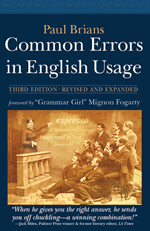Nicolas Chauvin of Rochefort became a laughingstock in Napoleon’s army for his exaggerated nationalism, and his name gave rise to the term “chauvinism,” which characterizes people who wildly overestimate the excellence and importance of their own countries while denigrating others. The word was then broadened to cover an exaggerated belief in the superiority of one’s own kind in other respects.
Following this pattern, feminists in the 1970s invented the term “male chauvinist” to label people who considered women inferior to men. Unfortunately, this was the context in which many people first encountered “chauvinism” and not understanding that it had a broader meaning, dropped the “male,” thinking that “chauvinist” was a synonym for “sexist.” This misunderstanding is so widespread that only occasionally will you encounter someone who knows better, but in formal writing it is wise to avoid the abbreviated form in this restricted meaning.
However, if you do intend the older meaning of the word, it’s also a good idea to make that clear from your context, for a great many of your readers will assume you are talking about sexism.
Back to list of errors

BUY THE BOOK!
